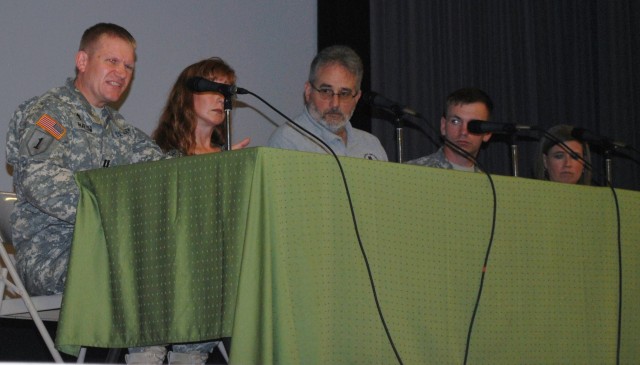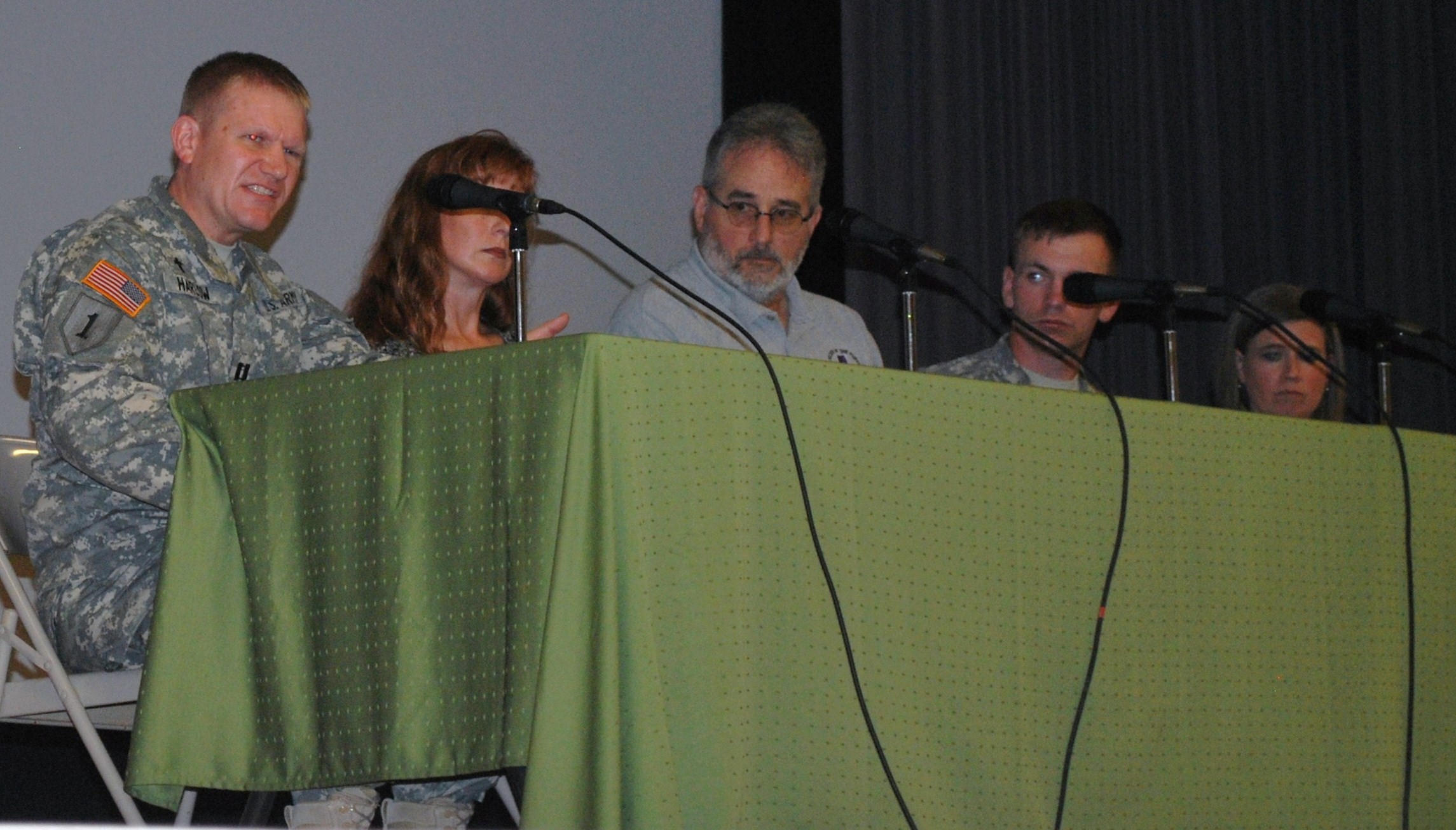FORT RILEY, Kan. - Soldiers were transported back to ancient Greece Sept. 16 at Barlow Theater, as part of a reading and panel discussion presented by Theater of War.
Soldiers watched actors perform Sophocles' "Ajax and Philoctetes," a Greek play about a fierce warrior who takes his own life at the end of the Trojan War after attempting to kill his senior commanders.
The play, performed in front of the Greek warriors when it was written, also delves into how the warrior's wife and his troops attempted to comfort and stop his suicidal thoughts.
Though it was written more than 2,500 years ago, the play resonated with Soldiers in the audience who are or know someone who struggles with Post Traumatic Stress Disorder or has been wounded in combat.
After the play, a panel of five local speakers told their stories of war, the depression that came after and how their friends, Families, doctors and brothers in arms helped them make it through.
Capt. Joshua Mantz, the aide-de-camp to Brig. Gen. David Petersen, 1st Inf. Div. deputy commanding general - rear, told his story of how he was shot during a vehicle search in Iraq on April 21, 2007, and flat-lined for 15 minutes before medics were able to revive him.
Mantz recovered and deployed to Iraq just five months after the incident.
"I arrived at Walter Reed, where they sent clinical psychologists into my room about every four hours to simply try to get me to talk about what happened. What that did is completely prevent any form of PTSD occurring within me whatsoever. It goes back to a very basic principal of psychology, and this is something you guys have to take with you, the earlier and more often you talk about a traumatic experience, the faster you will heal from that experience," Mantz said.
He said a lot of Soldiers have trouble seeing through traumatic experiences and fail to focus on the good that may come out of it, such as medics who work efficiently to help as many people as possible.
"I was Ajax," he said. "I had everybody trying to talk me out of going to Iraq and everything they were saying made absolute perfect sense. I did whatever it took to get back to Iraq."
He asked the Soldiers in the audience to keep any eye out for other Soldiers who have the same mentality he did after he got hurt and to help them through the decision of returning to war so soon after an injury.
"We've all heard that we call counterinsurgency the graduate level of warfare. I would submit to you that helping a Soldier recover from emotional distress is the graduate level of leadership," he said to the audience.
John Musgrave, a veteran, told his story to the Soldiers of when he was deployed as a rifleman during the Vietnam War with Company D, 3rd Platoon, 1st Battalion, 9th Marine Regiment, 3rd Marine Division.
"That was my Family," he said. "I had learned more of what it meant to be an American from those guys than I ever learned at home."
After his eighth day in Vietnam, he killed someone for the first time.
"I made a deal with the devil that day," he said.
He watched hundreds of thousands of people get killed every day on television, he said.
"I went to the movies. All my heroes killed people. All the cool, bad guys killed people," he said. "Real men kill people."
He said his first encounter was intimate, and at the end of it he "didn't feel like a real man."
He swore he would never kill another person as long as he lived, and in order to stay alive during his time in Vietnam, he made his enemy non-human.
"Hatred became my tool, my shield," he said. "You see I was an Eagle Scout and a Christian, and I had to kill with a clear conscious because if I couldn't kill, I was a threat to my buddies."
He said he was scared all the time.
"When nothing was happening, I was scared of what was going to happen. And when it hit the fan, I was terrified," Musgrave said.
He was wounded during an ambush in his 11th month of service and was brought back to the states.
"I was sent home alone in a hostile society that either thought I was a murderer or a coward," he said. "The World War II generation thought we were a bunch of cry babies that couldn't win our war, and our own contemporaries called us baby killers."
He said no one knew what PTSD was then.
"We were just (considered) weak," he said.
After he returned, he said he had a drink every night for a few years and a date with his gun.
It wasn't until he held his new baby son that he stopped and realized his children had a future and he needed to live for them, he said.
He told the Soldiers in the audience they were fortunate to have an Army available to them.
"There would be tens of thousands of Vietnam veterans alive today if only someone would have (cared)," he said.
He cautioned the Soldiers not to let another Soldier survive "only to die from the peace."
Bryan Doerries, founder of Theater of War, said of the 111 performances he has, the panel at Fort Riley was one of the most powerful he has ever heard.
He asked the audience why a general would have written this play for his officers and had it performed more than 2,500 years ago.
"The point of the play was to open the dialogue," said Pvt. Branden Robles, Headquarters and Headquarters Company, Special Troops Battalion, 4th Infantry Brigade Combat Team. "For the general, to get up and (speak about deployment distress). He was trying to name something no one had said out loud yet."
Capt. John Enderle, 2nd Battalion, 16th Infantry Regiment, 4th IBCT, said the play helped reduce the stigma associated with stress.
"As a leader of Soldiers, in his era, he faced some of the same challenges we face today, which is bridging that gap," he said.


Social Sharing